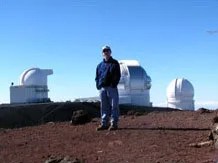
Dr. Michael Kelley
Planetary Science Division Scientist
Dr. Michael S. Kelley joined the Planetary Science Division at NASA Headquarters in 2008. In addition to more than twenty years of geological research, teaching, and field experience, Mike brought to the Division private sector corporate experience and many years of service to the planetary science community. Within the Planetary Defense Coordination Office, he serves as a Program Scientist for the Near-Earth Object Observations Program, conducts global asteroid observation campaigns, and oversees the Antarctic Search for Meteorites (ANSMET) Program. Mike serves as the Program scientist for the Mars Reconnaissance Orbiter, Mars Odyssey, Janus, and NEOWISE missions. He also serves as a Discipline Scientist for the Solar System Observations and other R&A and participating scientist programs. Mike previously served as Program Scientist for the EPOXI and Stardust-NExT comet encounter missions, the Dawn mission to Vesta and Ceres, and for the Planetary Data System. He frequently volunteers time for outreach events covering NASA’s planetary science activities.
Mike earned his bachelor’s in Geophysics from the University of Connecticut, and masters and doctoral degrees in Geology from Rensselaer Polytechnic Institute. Prior to joining NASA Headquarters, Mike held National Research Council Fellowships at the Department of Energy’s Hanford Site and at NASA’s Johnson Space Center and was a research faculty member at Georgia Southern University. He was a Visiting Astronomer at the NASA Infrared Telescope Facility for almost two decades, and served as chair of the Planetary Geology Division of the Geological Society of America and its award committees. He was awarded the Antarctic Service medal for his participation in the ANSMET Program, he is a Fellow of the Geological Society of America, and recipient of the Ronald Greeley Award for Distinguished Service. Asteroid (4477) 1983 SB was renamed “4477 Kelley” in recognition of Mike’s contributions to Planetary Science.
Please direct questions or corrections on this page to SARA@nasa.gov
























